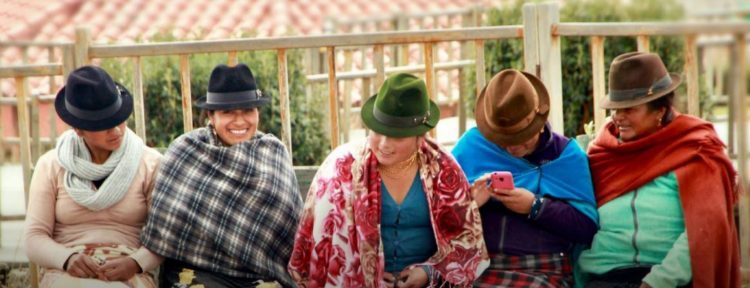By Annabelle Moreau Santos, consultant for the EUROsociAL+ Programme, Gender Equality Policies area, Master of Social Sciences and European Affairs

In early March 2021, the World Health Organization (WHO) noted that a third of the world’s women were victims of physical or sexual violence. Globally, over the last 10 years, this violence against women has not receded. Even more alarming: it has been exacerbated by and during the pandemic.
Given this health crisis scenario, what are the appropriate measures, which include a gender perspective, that can guarantee women victims of violence access to justice in Latin America and Europe?
The report entitled “Recommendations that Guarantee Women Survivors-Victims of Gender-Based Violence Access to Justice during COVID-19″ proposes responses at three levels. First, it compiles information on notable initiatives adopted by the Public Prosecutor’s Offices, prosecutors or attorneys’ offices (MP/F/PG) belonging to the Specialised Gender Network (REG) coordinated by the Ibero-American Association of Public Prosecutor’s Offices (AIAMP) in response to the new circumstances arising from the health crisis (1). In turn, the report highlights some of the persistent challenges for tax entities (2) and includes a series of recommendations developed and adopted by the REG (3). These recommendations are intended to guide the adoption by the region’s MP/F/PG of appropriate measures to prevent and eliminate impunity for violence against women, especially during the pandemic.
This document, prepared on the basis of the information provided by the delegations of 12 AIAMP REG countries, is the result of a collaboration between UN Women for Latin America and the Gender Equality Policies component of the European Union-financedEUROsociAL+ programme, the bi-regional Latin America-Europe programme and carried out by the Expertise France, consortium FIIAPP (leader) and the IILA. Therefore, the report is the result of the great efforts made by the Public Prosecutor’s Offices of Ibero-America in the REG AIAMP area, to adapt their structures and teams in order to respond to cases of violence against women in the context of the COVID-19 pandemic. In fact, EUROsociAL+ has supported and worked together with AIAMP since 2005, and specifically with the Specialised Gender Network since 2018, in order to promote the incorporation of the gender approach into actions undertaken by Public Prosecutor’s Offices and to strengthen gender-responsive criminal investigation and prosecution.
For more information on this collaboration, see the featured file.
Covid-19 limits access to justice
Françoise Roth, a consultant to UN Women and María Edith López Hernández, a consultant to the EUROsociAL+ gender area, identify in the report “Recommendations that Guarantee Women Survivors-Victims of Gender-Based Violence Access to Justice during COVID-19” obstacles that limit the access by women victims of gender violence to justice in the context of the pandemic. Indeed, Covid-19 has:
- made it difficult to access police stations to quickly report cases of violence;
- affected the functioning of justice operators / reduced judicial activities;
- limited the capacity of responsible bodies to carry out criminal investigations in optimal circumstances;
- changed the ongoing nature of care services for women victims of violence since teleworking may mean that prosecutors and officials in Public Prosecutor’s Offices face an overload in both work and psychological terms as they are in charge of caring for their own children or relatives;
- reduced the capacity for response by law enforcement agencies in relation to problems of gender-based violence (mostly focused on health issues such as the effective application of quarantine);
- led to the decongestion of prisons or the granting of house arrest to aggressors (measures that may entail adverse consequences for women).
In addition, added to these barriers are the obstacles that women victims-survivors of violence face in approaching justice services or in applying the required protection measures.
Zero tolerance for impunity
If Covid-19 has limited, and continues to stop these women’s access to justice, the pre-pandemic situation was already characterised by structural judicial congestion. Indeed, 98% of femicides in Latin America went unpunished.[1] The report co-prepared by EUROsociAL+ (“Recommendations that Guarantee Women Survivors-Victims of Gender-Based Violence Access to Justice during COVID-19”) proposes a series of solutions to this problem, collecting a total of 57 international recommendations and 48 suggestions from REG. They address a wide variety of issues, from the need to strengthen inter-agency coordination to that of analysing statistical and forensic information with a gender perspective. As well as focusing on intersectionality, via the urgency of establishing specific or face-to-face reporting mechanisms in places where refuges or shelter homes are located. To prepare the recommendations, a review was carried out of documents produced by international and regional mechanisms for the protection of human rights regarding the application of the norms, standards and principles of international human rights law during the pandemic. At the same time, other texts produced by agencies or programmes of the United Nations or the Organisation of American States, as well as non-governmental organisations, were also considered.
Finally, the document also presents a series of best practices adopted by Public Prosecutor’s Offices, prosecutors or attorneys’ offices in 8 Latin American countries (Colombia, Ecuador, Argentina, Uruguay, Panama, Guatemala, Chile and El Salvador) and best practices adopted by a European country (Spain) in response to the new circumstances arising from the health crisis. These measures implemented on both sides of the Atlantic not only pinpoint that Covid-19 has to a great extent contributed to the appearance of new obstacles that hinder the access of women victims of violence to justice, but also consider that this is not a new phenomenon, but a systemic problem inherited from preceding decades.



